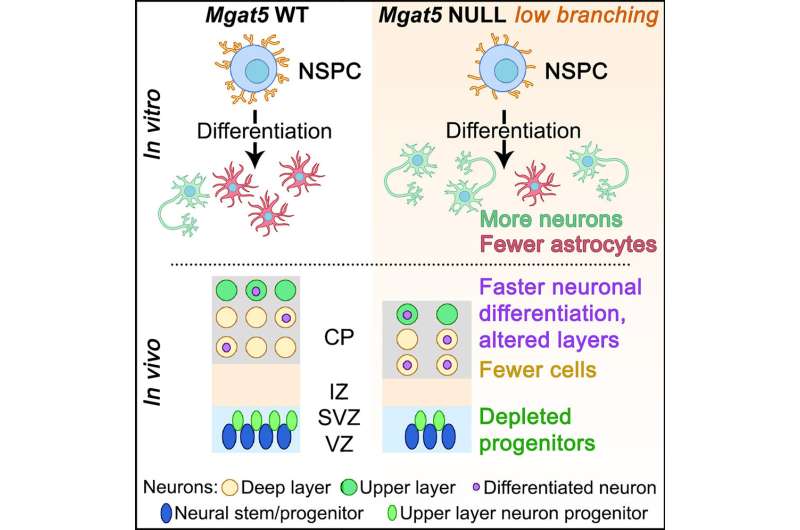This article has been reviewed according to Science X's editorial process and policies. Editors have highlighted the following attributes while ensuring the content's credibility:
fact-checked
peer-reviewed publication
trusted source
proofread
Research team identifies glycosylation enzyme critical in brain formation

The MGAT5 glycosylation enzyme plays a crucial role in brain development, according to a study by University of California, Irvine researchers, a discovery that may contribute to new therapeutic purposes for neural stem cells.
Neurons, astrocytes and oligodendrocytes are the final mature cells of the brain and spinal cord formed by neural stem cells. Each has distinct and key functions. Neurons transmit signals, astrocytes help modify those signals, and oligodendrocytes keep the signals from degrading. When any cells make proteins or fats that end up on the cell surface, they often add small sugar molecules. The team tested whether this internal process—called glycosylation—affects how neural stem cells form mature brain cells.
The study, published in the journal Stem Cell Reports, found that during glycosylation, the MGAT5 enzyme significantly regulates the formation of neurons and astrocytes from neural stem cells. Neural stem cells that don't have MGAT5 make more neurons and fewer astrocytes during the very early stages of brain development, altering its structure. These changes may contribute to later aberrant behavior patterns, including abnormal social interactions and repetitive actions.
"Now that we know MGAT5 and glycosylation have a substantial impact on neuron and astrocyte formation, we have a better idea of how our nervous system develops," said corresponding author Lisa Flanagan, professor of neurology in UCI's School of Medicine. "We hope these findings will contribute to the use of neural stem cells for therapeutic purposes by providing new information about the factors regulating these cells."
It was known that neural stem cells respond to the external signals they encounter during development. But it was not known whether neural stem cells could modify their responses to those signals. The team analyzed the role of glycosylation enzymes in brain maturation by comparing control mice to those whose neural stem cells did not have the MGAT5 enzyme. It found that neural stem cells use glycosylation to manage their reactions to external signals and regulate the development of mature brain cells.
"As we continue our work, we hope to determine which cell surface proteins and pathways controlled by glycosylation are critical for neuron and astrocyte formation," Flanagan said. "This will give us better insight into the external signals significantly modified by neural stem cell glycosylation, which will, in turn, help to decode the complex processes that occur during brain development and expand the therapeutic usefulness of neural stem cells."
The team included researchers from the School of Medicine's departments of anatomy & neurobiology, neurology, and pathology & laboratory medicine as well as The Henry Samueli School of Engineering's Department of Biomedical Engineering and the Sue & Bill Gross Stem Cell Research Center.
More information: Andrew R. Yale et al, Regulation of neural stem cell differentiation and brain development by MGAT5-mediated N-glycosylation, Stem Cell Reports (2023). DOI: 10.1016/j.stemcr.2023.04.007




















